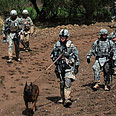
US soldiers on patrol in Iraq
צילום: AFP
Violence in Iraq falls to lowest level in 4 years
Military releases encouraging figures as Washington's surge continues to reap successes, US envoy to Baghdad says al-Qaeda closer than ever to defeat
Violence in Iraq has fallen to its lowest level in more than four years, figures released by the US military showed on Saturday, but officials said progress was still fragile and reversible.
Iraqi security officials said an offensive against al Qaeda in the northern city of Mosul, which the US military says is the Sunni Islamist group's last major urban stronghold, had wiped out most of the insurgent network.
Washington's envoy to Iraq, Ryan Crocker, declared that al Qaeda had never been closer to defeat. The United States says the group is the biggest threat to peace in Iraq and has blamed it for most of Iraq's deadliest suicide bombings.
"You are not going to hear me say that al Qaeda is defeated, but they've never been closer to defeat than they are now," Crocker told reporters during a visit to the Shi'ite holy cities of Najaf and Kerbala in southern Iraq.
The US military released slides showing that incidents of violence, including roadside bombs, shootings and mortar and rocket attacks, had fallen to their lowest level since the week of March 26, 2004.
The drop follows a surge in violence that threatened to unravel the security gains made over the past year. A government offensive against Shi'ite militias in the southern city of Basra in March sparked widespread violence in other towns and cities.
The figures are good news for US President George W. Bush, who sent 30,000 extra troops to Iraq last year to halt a slide toward sectarian civil war and has rejected calls by Democrats for 155,000 troops to be withdrawn as soon as possible.
Bush has argued that this would hand victory to al Qaeda, a position shared by Republican presidential candidate John McCain. The two Democratic candidates, Barack Obama and Hillary Clinton, have campaigned for troops to be brought home.
Sadrists issue warning
According to one of the unclassified slides made available to Reuters, the number of incidents in the week ending May 23 was around 300, down from a high of nearly 1,600 in mid-June 2007."For security reasons we cannot give out exact figures, so this is a ballpark figure," US military spokesman Major John Hall explained.
He attributed the fall in violence to the growth in the capabilities of the Iraqi security forces and their increased involvement in counter-insurgency operations, the formation of largely Sunni Arab neighborhood patrol units, and a ceasefire declared by anti-American cleric Moqtada al-Sadr.
"There has been significant but uneven security progress in Iraq. The levels of violence and civilian deaths have been reduced substantially," he said, adding that the progress was "fragile and reversible".
"Al Qaeda in Iraq and a number of other extremist elements have been dealt serious blows," he said.
The group, which has defied previous predictions of its demise, sought haven in Iraq's northern provinces after being pushed out of western Anbar province and Baghdad last year.
Interior Ministry spokesman Major-General Abdul-Karim Khalaf said Iraqi-led operations in Mosul, capital of Nineveh province, had destroyed "most of the insurgents' network".
"We have arrested most of the wanted men and the operations are continuing. The are no longer big challenges in Mosul. There will always be sleeper cells, but that is not important because we will be able to deal with those cells," he said.
Iraqi Prime Minister Nuri al-Maliki launched the offensive against al Qaeda in Mosul as part of a wider plan to stamp his government's authority over areas where armed groups hold sway.
Iraqi troops now patrol Basra after reaching a truce with Mehdi Army fighters loyal to Shi'ite cleric Moqtada al-Sadr.
Tens of thousands of troops moved unopposed this week into Sadr City, Sadr's Baghdad bastion, under a separate truce that ended nearly seven weeks of fighting with US and Iraqi forces.
The fragile truces in Basra and Baghdad were tested on Friday when Iraqi security forces fired into the air to disperse worshippers loyal to Sadr who had gathered for the Friday Muslim prayers in an open square. At least six people were wounded.
At about the same time, police raided Baghdad's Amil district, arresting about 400 people, many of whom had gathered at Sadr's office, which doubles as a mosque, for Friday prayers.
"This aggression on our Friday prayers is a new escalation which could have grave consequences for the future," Salah al- Ubaidi, spokesman for Sadr, said on Saturday.










